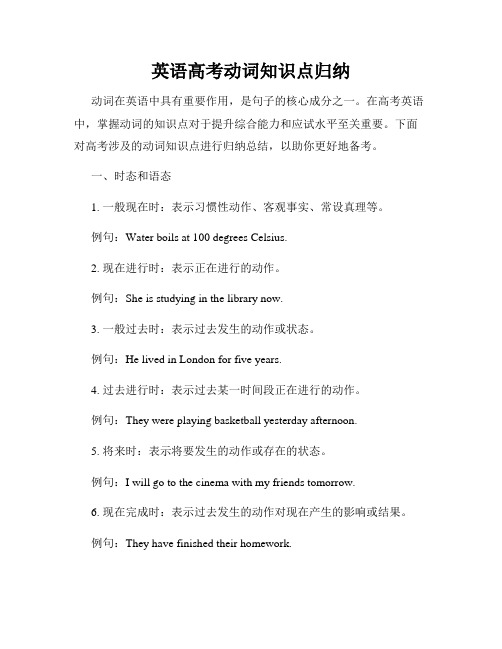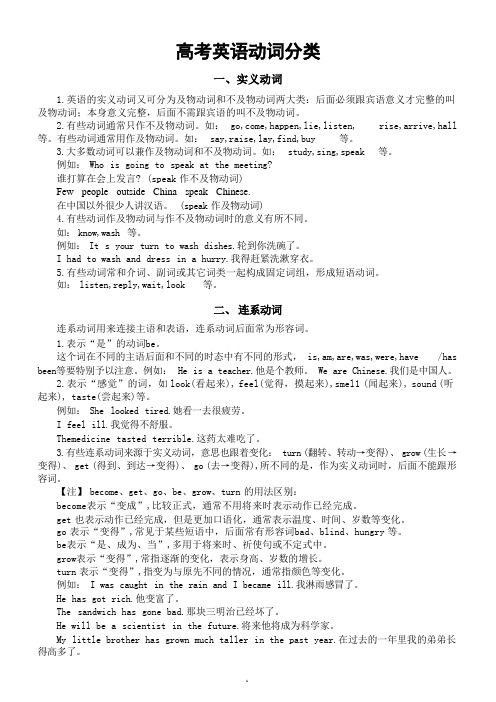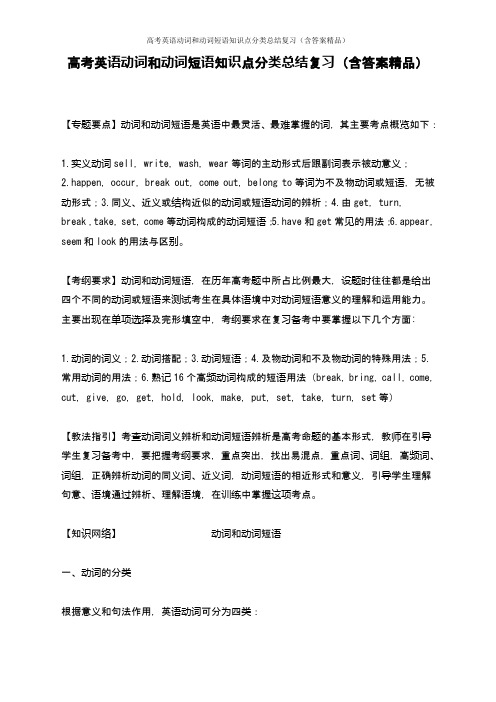高考英语动词归类复习总结
高中英语语法分类总结--动词及动词短语

pay
attentionBto our table manners. (05江苏卷)
A. demanded B. reminded C. allowed D. hoped 3. --- Ow! I’ve burnt myself! — How did you do that?
④问句形式:
一般问句:Is/Was it + 被强调部 分
+ that + ----
Is it the dictionary that you are looking for?
Was it yesterday that he was fired?
特殊问句:疑问词+is/was +it +that +-----
B.referring to
C.looking for
D.trying on
2、What shall we use for power when all the oil in the
world A
has ______? (05山东卷)
第一A.题gi只ve需n o要ut正B确. 理pu解t o句ut意C就. h不el难d u发p现答D案. 。use第d 二up题
主 一致 谓语 语
① 主谓一致:被强调部分作主语 时,其形式与谓语动词在人称和数 上保持一致。
It is Mary who oftehne_lp___ (help/helps) me witsh my English.
It is I that a_m___ (be) against you.
英语高考动词知识点归纳

英语高考动词知识点归纳动词在英语中具有重要作用,是句子的核心成分之一。
在高考英语中,掌握动词的知识点对于提升综合能力和应试水平至关重要。
下面对高考涉及的动词知识点进行归纳总结,以助你更好地备考。
一、时态和语态1. 一般现在时:表示习惯性动作、客观事实、常设真理等。
例句:Water boils at 100 degrees Celsius.2. 现在进行时:表示正在进行的动作。
例句:She is studying in the library now.3. 一般过去时:表示过去发生的动作或状态。
例句:He lived in London for five years.4. 过去进行时:表示过去某一时间段正在进行的动作。
例句:They were playing basketball yesterday afternoon.5. 将来时:表示将要发生的动作或存在的状态。
例句:I will go to the cinema with my friends tomorrow.6. 现在完成时:表示过去发生的动作对现在产生的影响或结果。
例句:They have finished their homework.7. 过去完成时:表示过去某一时间点之前已经发生的动作或存在的状态。
例句:I had already eaten dinner when he arrived.8. 被动语态:强调动作的承受者或结果。
例句:The book was written by Mark Twain.二、情态动词1. can/could:表示能力、允许、请求等。
例句:She can swim very well.2. may/might:表示可能性、许可、建议等。
例句:You may borrow my book.3. must:表示必须、推测等。
例句:You must finish your homework before watching TV.4. will/would:表示意愿、打算、愿意等。
高考英语常见系动词分类总结

高考英语常见系动词分类总结1.表感官的系动词:look, sound, taste, smell, feel(这些词用形容词作表语)2.表似乎的系动词seem, appear3.表变化的系动词:become, get, turn, grow, make, come, go, fall, run4.表依旧的系动词:remain, keep, stay, continue, stand, rest, lie, hold5.可带名词作表语的系动词:become, make, look, sound, fall, prove, remain, turn(该词后接的单数名词前多不用冠词。
如:He turned teacher.)6.如果读者对于这个语法现象还是不怎么理解的话,可以以这个名句为例子学学:the man who dies rich dies disgraced.在巨富中死去,是一种耻辱。
其中的rich and disgraced 是说明主语的性质的。
1)状态系动词用来表示主语状态,只有be一词,例如:He is a teacher. 他是一名教师。
(is与补足语一起说明主语的身份。
)2)持续系动词用来表示主语继续或保持一种状况或态度,主要有keep, rest, remain, stay, lie, stand, 例如:He always kept silent at meeting. 他开会时总保持沉默。
This matter rests a mystery. 此事仍是一个谜。
3)表像系动词用来表示"看起来像"这一概念,主要有seem, appear, look, 例如:He looks tired. 他看起来很累。
He seems (to be) very sad. 他看起来很伤心。
4)感官系动词感官系动词主要有feel, smell, sound, taste, 例如:This kind of cloth feels very soft. 这种布手感很软。
高中英语高考动词分类汇总(共四大类)

高考英语动词分类一、实义动词1.英语的实义动词又可分为及物动词和不及物动词两大类:后面必须跟宾语意义才完整的叫及物动词;本身意义完整,后面不需跟宾语的叫不及物动词。
2.有些动词通常只作不及物动词。
如: go,come,happen,lie,listen, rise,arrive,hall 等。
有些动词通常用作及物动词。
如:say,raise,lay,find,buy 等。
3.大多数动词可以兼作及物动词和不及物动词。
如:study,sing,speak 等。
例如: Who is going to speak at the meeting?谁打算在会上发言? (speak 作不及物动词)Few people outside China speak Chinese.在中国以外很少人讲汉语。
(speak 作及物动词)4.有些动词作及物动词与作不及物动词时的意义有所不同。
如:know,wash 等。
例如:It s your turn to wash dishes.轮到你洗碗了。
I had to wash and dress in a hurry.我得赶紧洗漱穿衣。
5.有些动词常和介词、副词或其它词类一起构成固定词组,形成短语动词。
如:listen,reply,wait,look 等。
二、连系动词连系动词用来连接主语和表语,连系动词后面常为形容词。
1.表示“是”的动词be。
这个词在不同的主语后面和不同的时态中有不同的形式, is,am,are,was,were,have /has been等要特别予以注意。
例如: He is a teacher.他是个教师。
We are Chinese.我们是中国人。
2.表示“感觉”的词,如look(看起来), feel(觉得,摸起来),smel1 (闻起来), sound (听起来), taste(尝起来)等。
例如: She looked tired.她看一去很疲劳。
I feel ill.我觉得不舒服。
高三英语动词归类复习学生课堂笔记

高三英语动词归类复习学生课堂笔记一、连系动词类①变化类: become get turn grow make come go fall②感官类: look sound feel taste smell③显得类: seem appear look④状态类: keep stay remain lie sit stand (prove turn out)二、使役、感官动词类: see look at watch notice observe let make have/get hear listen to feel提示:吾看三室两厅一感觉三、主动表被动: sell wash burn cook cut drive dress play last open write start run read act draw提示:说明主语的特点、性质、状态四、只接动名词做宾语的词/词组: consider suggest/advise look forward to excuse/pardon admit put off/delay/postpone fancy avoid miss keep/keep on practice deny finish enjoy/appreciate forbid imagine risk can’t help mind allow/permit escape提示:考虑建议盼原谅,承认推迟没得想。
避免错过继续练,否认完成就欣赏。
禁止想象才冒险,不禁介意准逃亡。
①“to”作介词get down to devote… to lead to be/get/become used togo back to object to②带有介词in succeed(in) spend/waste time(in) be busy(in)have a good/hard time(in) have difficulty/trouble(in)③give up dislike feel like insist on can’t stand understand④“值得”be worth=deserve be worthy of being done / be worthy to be done⑤It is no use/good It is of little use/good It is useless五、只接不定式作宾语的词/词组:decide/determine learn want expect/hope/wish refuse manage care pretend offer promise choose plan agree ask/beg help提示:决心学会想希望,拒绝设法愿假装。
高考英语动词知识点总结

高考英语动词知识点总结动词在英语中扮演着重要的角色,是句子的核心成分之一。
在高考英语中,动词的使用和运用能力直接影响着考生的语言表达能力和分数。
因此,对于高考英语动词知识点的总结和掌握显得尤为重要。
本文将从常见动词的分类、时态的使用、动词短语的运用等几个方面进行论述,以帮助高中生更好地备考。
一、常见动词的分类在英语中,动词可以被分为不规则动词和规则动词两类。
不规则动词的变形方式与一般规则不同,需要特别记忆。
常见的不规则动词有be、have、do、go等。
规则动词则按照固定的变形方式进行相应变化,主要包括一般动词、动词原形和动词的过去分词形式。
掌握这些动词的分类和变形规则,能够帮助高中生更加顺利地进行语言表达。
二、时态的使用时态是动词的一种变化形式,表示动作发生的时间。
日常生活中,我们常用到的时态有一般现在时、一般过去时、一般将来时等。
在高考英语中,掌握时态的正确使用是必不可少的。
一般现在时用来表示经常性或习惯性的动作,说明客观真理或科学事实;一般过去时用来表示过去的事件或状态;一般将来时则用来表示将来的时间。
理解并正确使用这些时态,能够提高高中生的写作和阅读能力。
三、动词短语的运用动词短语是由一个或多个词构成的固定搭配形式,往往具有一个整体的意义。
在高考英语中,动词短语的正确使用能够丰富句子的表达,使语言更加地生动。
例如,break down意为“出故障、中断”,come up with意为“提出、想出”,give up意为“放弃”等等。
掌握这些常见的动词短语,有助于提高高中生在英语写作和阅读中的表达能力。
四、动词的语态动词的语态指的是动作的主体和客体之间的关系。
英语中常见的语态有主动语态和被动语态。
主动语态表示主体主动进行或实施动作,而被动语态则表示主体是动作的承受者。
在高考英语中,被动语态常常用于句子中的强调或者当主语不确定时。
例如,“The book was written by him.”这句话就是被动语态,强调了谁写了这本书。
高考英语单词分类总结

listen to sb
sound like sth
hear sb
arrive in/at
get to
reach
belong to sb
own sth
possess sth
lie in +
be situated in +
be located in +
contact with sb
助动词
1
be
形式变化:am/ is/ are/ was/ were/ been/ being
同时是实义和系动词
2
do
形式变化:does/ did
同时是实义动词
3
have
形式变化:has/ had/ having
同时是实义动词
4
shall
形式变化:should
同时是情态动词
5
will
形式变化:would
fail + in
succeed +in doing
fall +off/ onto
struggle + for/ against
vote +for/ against
care + for/about
apologize + to sb for doing
argue + about sth with sb
作及物动词时是"升高;举起"。He lifted his glass and drank.
类似的还有:beat vi.(心脏)跳动/vt.敲、打; grow vi.生长/ vt.种植
play vi.玩耍/ vt.打(牌、球)演奏smell vi.发出(气味)/ vt.嗅
高考英语动词和动词短语知识点分类总结复习(含答案精品)

高考英语动词和动词短语知识点分类总结复习(含答案精品)【专题要点】动词和动词短语是英语中最灵活、最难掌握的词,其主要考点概览如下:1.实义动词sell, write, wash, wear等词的主动形式后跟副词表示被动意义;2.happen, occur, break out, come out, belong to等词为不及物动词或短语,无被动形式;3.同义、近义或结构近似的动词或短语动词的辨析;4.由get, turn,break ,take, set, come等动词构成的动词短语;5.have和get常见的用法;6.appear, seem和look的用法与区别。
【考纲要求】动词和动词短语,在历年高考题中所占比例最大,设题时往往都是给出四个不同的动词或短语来测试考生在具体语境中对动词短语意义的理解和运用能力。
主要出现在单项选择及完形填空中,考纲要求在复习备考中要掌握以下几个方面:1.动词的词义;2.动词搭配;3.动词短语;4.及物动词和不及物动词的特殊用法;5.常用动词的用法;6.熟记16个高频动词构成的短语用法(break, bring, call, come, cut, give, go, get, hold, look, make, put, set, take, turn, set等)【教法指引】考查动词词义辨析和动词短语辨析是高考命题的基本形式,教师在引导学生复习备考中,要把握考纲要求,重点突出,找出易混点,重点词、词组,高频词、词组,正确辨析动词的同义词、近义词,动词短语的相近形式和意义,引导学生理解句意、语境通过辨析、理解语境,在训练中掌握这项考点。
【知识网络】动词和动词短语一、动词的分类根据意义和句法作用,英语动词可分为四类:1.行为动词(实义动词)①及物动词(带宾语):study, develop;②不及物动词(不带宾语)work, swim, go, come③状态动词(相对静止)contain, exist, own, prefer, belong④动作动词延续性(work, stay);非延续性(marry, go, come)2.系动词①表示人或事物的特征和状态:be, feel, look, seem, taste, appear, sound②表示状态的变化:turn, go, become, get, fall, grow③表示某种状态的延续或持续:remain, keep, stay3.助动词(与动词原形或分词构成复合谓语):be(am,is,are),do(does,did);have(has);will,would,shall4.情态动词:can(could),may(might),must,shall(should)二、动词及动词短语(一)、动词词义辨析动词是是各类考试的重点,高考试题中,单项填空、完形填空和改错等三项题型中,动词辨义的比重较大,并逐年增加。
- 1、下载文档前请自行甄别文档内容的完整性,平台不提供额外的编辑、内容补充、找答案等附加服务。
- 2、"仅部分预览"的文档,不可在线预览部分如存在完整性等问题,可反馈申请退款(可完整预览的文档不适用该条件!)。
- 3、如文档侵犯您的权益,请联系客服反馈,我们会尽快为您处理(人工客服工作时间:9:00-18:30)。
高考英语动词归类复习一、连系动词二、使役、感观动词三、主动表被动四、只接动名词做宾语的词、词组五、只接不定式作宾语的词、词组六、宾语不同、意义不同七、接动名词、不定式意义区别不大八、宾语不同、语态不同、但意义相同九、接宾语和宾补、形式不同十、接虚拟语气的词十一、瞬间非延续性动词十二、表计划未能实现的动词十三、情感动词类十四、否定前移类十五、不带不定式作复合宾语十六、省略替代类一、连系动词类①变化类:become, get, turn, grow, make, come, go, fall ,go bad / hungry / mad / wrong,fall (fell-fallen) ill / asleep※feel (felt-felt) sick / sleepy②感观类:look, sound, feel, taste, smellHis voice sounds ________.A. wellB. beautifullyC. excellentD. wonderfully③显得类:seem, appear, look It looks as if…It seems as if / that…It appears that…④状态类:keep, stay, remain, lie, sit, stand ★prove, turn out The weather will _____ hot for another two weeks.A. lastB. remainC. getD. turnThe hot weather will ____another two days.A. lastB. remainC. getD. turnThe weather turned out (to be)fine. He proved (to be) honest / an honest person.注:be, become, turn, remain 可带名词He remains a teacher.=He is still a teacher.He became _____ teacher. A. a B. the C. an D. / He turned _______ teacher. A. a B. the C. an D. / 二、使役、感观动词类:let, make, have,see, look at, watch, notice, observe, hear listen to, feelThe boss made them _____12 hours a day.A. workB. to workC. workedD. workingThey were made_______12 hours a day.A. workB. to workC. workedD. workingThe boy was last seen _______football on the playground.A. playB. playingC. to playD. playedHe often heard this song _______by the famous singer.A. singB. singingC. to singD. sungHe had his leg_______.A. breakB. breakingC. to breakD. broken三、主动表被动类:( well, poorly, easily)sell, wash, burn, cook, cut, drive, dress, play, last, open, write, start, translate, run, read, operate, break, measure, weighDry wood burns easily. The cloth washes well. This phrase does not translate well into Chinese.The man always dresses well / poorly. Your composition reads well except for a few spelling mistakes.----Have you got a ticket for the concert? ----No, the tickets____well and they _____out last week.A. sell; were soldB. sell; soldC. sell; have been sold D .are sell; soldDon’t get that ink on your white shirt, for it___.A. won’t wash outB. doesn’t wash awayC. isn’t washing outD. hasn’t washed awayThey tried to get the car ____, but it won’t____.A. started; startB. to start; startC. started; startedD. to start; to start四、只接动名词做宾语的词/词组mind, risk, avoid, enjoy, miss, keep, suggest, appreciate, practise, delay, finish, dislike, excuse, imagine, consider, forbid, escape,admit, advise, allow, put off, give up, be worth, be busy,get down to, devote…to, look forward to, be used to, lead to, succeed in, spend/waste time (in),have a good/hard time (in) , have difficulty /trouble (in) ,there is no use(in)She looked forward every spring to___ the flower-lined garden.A. visitB. paying a visitC. walk inD. walking inI would appreciate ______back this afternoon.A. you to callB. you callC. your callingD. you’re callingThe day he has looked forward to______ at last.A. comingB. cameC. comeD. comes五、只接不定式作宾语的词/词组decide, expect, hope, wish, order, refuse, promise, pretend, agree, seem, attempt, fail, offer, happen, warn, afford,make up one’s mind to, be determined to,used to, be about to, be able to, have to , would like/ love to=should like/love toI would love ______to the party last night but I had to work extra hours to finish a report.A. to goB. to have goneC. goingD. having goneMr Smith warned her son ______after drinking.A. never to driveB. to never driveC. never drivingD. never drive She pretended _______me when I passed by.A. not to seeB. not seeingC. to not seeD. having not seen六、宾语不同、意义不同n 1) go on to do / go on doingn 2) stop to do / stop doingn 3) remember to do / remember doingn 4) forget to do / forget doingn 5) mean to do / mean doingn 6) regret to do / regret doingn 7) try to do / try doingn 8) can’t help (to) do / can’t help doingn ★can’t help but do=can’t but do =have to doI can’t help but tell him the truth.---I usually go there by train. ---Why not ______by boat for a change?A. to try goingB. trying to goC. to try and goD. try going---The light in the office is still on. ---Oh, I forgot___.A. turning it offB. turn it offC. to turn it offD. having turned it off He didn’t remember ______him before.A. having metB. have metC. to meetD. to having metGo on ______the other exercise after you have finished this one. A. to do B. doing C. to be doing D .to be done---You were brave enough to raise objections at the meeting.---Well, now I regret _______that.A. to doB. to be doingC. to have doneD. having done七、接动名词、不定式意义区别不大begin , start, continue, like, love, hate,prefer,It began raining. It is beginning to rain.I prefer staying home to going out. I prefer to stay home rather than go out.Tired as he was, he continued to work. =Though he was very tired, he continued working.He likes playing football, but he doesn’t like to play football today.八、宾语不同、语态不同、但意义相同need, require, want, deserve The room requires to be cleaned. =The room requires cleaning. This sentence needs_________.A. an improvementB. improveC. improvingD. improvedThe baby needs________.A. looked afterB. looking afterC. look afterD. to look after九、接宾语和宾补、形式不同allow, permit, forbid, advise, admit considerWe forbid smoking here. We forbid anybody to smoke here. You are forbidden to smoke here.We are considering _______ to the south.A. goB. to goC. goingD. goneCharles Babbage is generally considered ___the first computer.A.to have inventedB.inventingC.to inventD.having invented十、接虚拟语气的词1)insist 2)order, command 3)advise, suggest, propose , recommend 4)demand, ask, require, requestHe ordered that we (should)leave at once. His order that we (should) leave at once was right.The order was that we (should) leave at once. That we (should) leave at once was his order.He insisted that his brother_____ there.A. goB. wentC. goingD. to goHe insisted that he____ nothing wrong and ____ set free.A. do; beB. had done; wasC. had done; beD. did; wasHis voice suggested that he ______angry.A. isB. beC. wasD. wereHe suggested that the boy _____ sent to hospital at once.A. wasB. beC. isD. were十一、瞬间非延续性动词go, come, leave, start, return, arrive, stop, finish, borrow, lend, open, close, die, become, break, join, kill, marry, graduate, buy,marry--be married seat--be seated hide--behidden engage--be engaged die--be dead begin--beon join--be in borrow--keep come--be/stay leave--be away buy--have=have gotHe died ten years ago, that’s to say, he has __ for ten years.A. been diedB. been deadC. diedD. been dyingWhen Jack arrived he learned Mary ___for almost an hour.A. had goneB. had set off C .had left D. had been awayHe is leaving for Beijing tomorrow. The boy is so sick that he is dying fast. The bus is coming.The train is leaving. I am going.十二、表计划未能实现的动词intend, mean ,hope, plan, expect, think, want, suppose, promiseI had hoped to come here, but I had an unexpected visitor.=I hoped to have come here,…….★Would /should +love / like to have doneHe wants to meet you at the airport. He wanted to have met you at the airport, but he didn’t get there in time.We planned to have done good deeds for the poor people last month. I should (would) like (love) to give her the gift.I should(would) like (love) to have given her the gift. He would like to have played the violin at the concert.十三、情感动词类n 表示人的内在感受的动词encourage, excite, inspire, interest, amaze, satisfy, delight, please, move, frighten, surprise, astonish, shock, disappoint, discourage, puzzle, worry, tire, touch, relaxThe news sounds _____________.(encourage)The play was so ___________ that nearly everybody was _________ to tears.(move)Looking at her paper, she nodded with a___________ smile on her face.(satisfy)He looked at me with a __________ look. (puzzle)十四、否定前移类believe, imagine, suppose, think, feel , guessI don’t think he can finish the work,____?A. can’t heB. can heC. do ID. don’t IWe don’t believe she knows it,______?A. does sheB. doesn’t sheC. do weD. don’t weYou don’t think he can finish it, ______?A. do youB. don’t youC. can heD. can’t he十五、不带不定式作复合宾语hope, agree, suggest, demand, imagine, would ratherI wish him to come.=I hope that he will come.I allowed/permitted him to go there.=I agreed that he can go there. He advised me to do it right now.=He suggested (to me) that I (should) do it right now.I prefer him to go there.=I would rather he went there.I can’t imagine such a girl like Mary doing such a thing.He wanted me to do it.=He demanded that I (should)do it.十六、省略替代类1)believe, think, suppose, expect, guessI think so. I think not = I don’t think so2) hope, fear, be afraid + so / not3) intend, want, plan, wish, like, love, hate, hope, try, would (should) like / love toDo you want to have a rest? Yes, I want to, but I can’t.Did you get the new stamps? No,I tried to, but there wasn’t any left in that post office.I didn’t mean to call you at late night,but I had to as I did have something important to tell you.。
